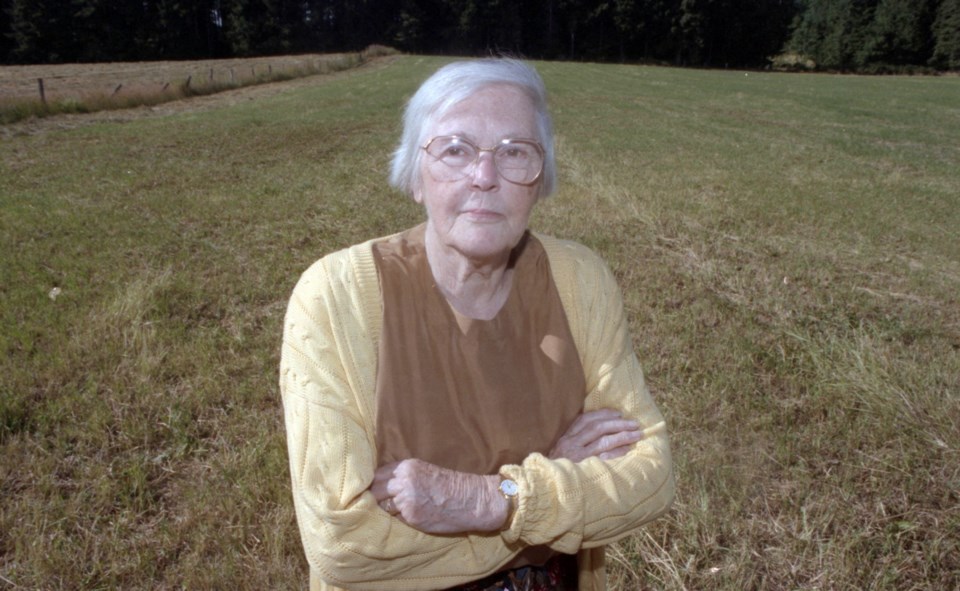Cobble Hill native Dr. Frances Oldham Kelsey, who became a health-care hero by preventing legalization of the drug thalidomide in the United States, died Friday at the age of 101.
At the request of the Governor General, Ontario’s lieutenant-governor travelled to Kelsey’s home in London, Ont. Thursday to make the presentation of her Order of Canada medal. She was named to the order last month.
The Governor General’s office was aware that Kelsey was unwell and asked that the medal be delivered in person to her. She lived at the home of her daughter, Christine Kelsey, for the past 18 months after spending her adult life in the U.S.
“I think she was an absolute hero,” said Alan Cassels, a University of Victoria drug researcher.
“She did what we expect regulators to do — she stood up to the bullies in the drug industry” to protect the American public — an incredible achievement for a woman at the time, he said.
In 1960, Kelsey — a practising doctor at the time — accepted an offer to become a medical officer at the U.S. Food and Drug Administration and changed the course of American medical history.
“Kelsey helped shape and enforce amendments to FDA drug regulation laws to institutionalize protection of the patient in drug investigations,” says the website of the U.S. National Institutes of Health.
“These regulations required that drugs be shown to be both safe and effective, that informed consent be obtained from patients when used in clinical trials, and that adverse reactions be reported to the FDA.”
Susanne Klausen, a medical historian at Carleton University involved with the nomination for the Order of Canada, said Kelsey exemplified the courage of one’s convictions. “She saved untold hardships for thousands of individuals,” Klausen said. Her principled stance under duress led to U.S. legislation requiring drugs be shown to be safe and effective prior to licensing. “That’s an amazing impact to have on your country’s public health system.”
U.S. President John F. Kennedy presented Kelsey with the President’s Award for Distinguished Federal Civilian Service on Aug. 7, 1962.
The award recognized her role in preventing the tragedy that befell babies in 20 countries, including Canada, when their mothers took thalidomide for insomnia and nausea. Those babies were born with birth defects ranging from truncated arms and legs to nerve damage, deafness and blindness.
“Her exceptional judgment in evaluating a new drug for safety for human use has prevented a major tragedy of birth deformities in the United States,” said Kennedy in bestowing the honour.
“Through high ability and steadfast confidence in her professional decision, she has made an outstanding contribution to the protection of the health of the American people.”
The Royal Astronomical Society named Asteroid 6260 in her honour and Frances Kelsey Secondary School was officially opened in Mill Bay in 1995.
The school is not far from where young Frances Oldham grew up as a tomboy, one of four children born to a well-off Scottish mother, Frances Katherine Stuart, and English father, Col. Frank Trevor Oldham, on Shawnigan Lake Road.
Kelsey, who was born July 24, 1914, attended St. Margaret’s School in Victoria, graduating at 15 determined to be a scientist, then continued her studies at Victoria College, the University of B.C. and McGill University in Montreal. She always assumed she would work in Canada, but the Depression changed that, she told the Times Colonist.
She married her pharmacologist husband, Dr. F. Ellis Kelsey, in 1943 while at the University of Chicago, where she earned a doctorate in pharmacology and a medical degree. She brought him and their daughters, Christine and Susan, back to Cobble Hill every summer until her parents died. Ellis Kelsey died in 1966.
Kelsey continued working as a scientist until the age of 91.
“She certainly had a splendid life, well-lived,” said Cheryl Warsh, a Vancouver Island University historian who is writing a book on Kelsey and kept in touch with her daughter.
Warsh said she was glad to know that Kelsey was alert for the presentation of the Order of Canada medal, noting that as a longtime U.S. resident, Kelsey was somewhat “off the radar” for the recognition.
Warsh, who has access to 100 boxes of documents that belonged to Kelsey, is immersed in countless letters the scientist received from American women in the early 1960s, thanking her for preventing personal disaster in their lives.
Kelsey had spoken to Canadian officials about her concerns about thalidomide, Warsh said, but authorities did not take quick action.
The historian ranks Kelsey among the top five scientists in Canadian history, along with diabetes treatment pioneers Frederick Banting and Charles Best, in terms of global influence. “She was a pioneer woman scientist in Canada and there were so few.”
— With a file from Cindy E. Harnett
A July 1962 story on the front page of the Washington Post brought public attention to the important work of Frances Kelsey: ‘Heroine’ of FDA keeps bad drug off market
Washington Post obituary for Frances Kelsey: Frances Oldham Kelsey, FDA scientist who kept thalidomide off U.S. market, dies at 101



